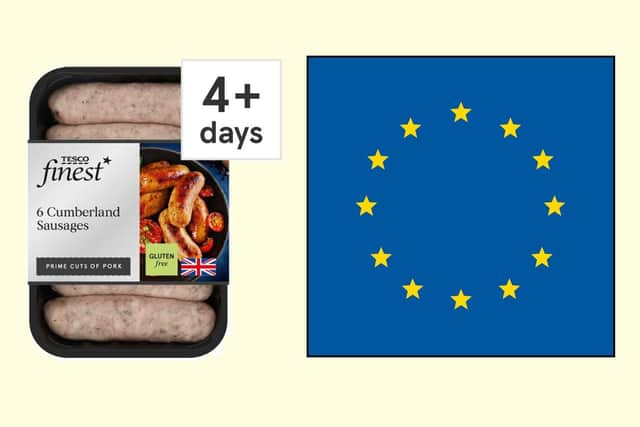EU and UK government refuse to say how post-Brexit rules on cross-border sausage movement could possibly be enforced - and whether individual consumers may be penalised
and live on Freeview channel 276
Taken literally, the EU regulations appear to mean that if somebody bought a pack of British sausages from a Newry supermarket, then ate them at a picnic in Dundalk, they would be in breach of the rules.
That is because their wording does not only ban the "sale" of GB meat and dairy goods purchased in Northern Ireland in the Republic of Ireland, but bans their "movement" across the border altogether.
Advertisement
Hide AdAdvertisement
Hide AdThe News Letter has repeatedly put this scenario to both the EU and UK government and invited them to correct this interpretation of the rules if it is wrong.


They were also asked to explain how it would be possible to enforce such a thing.
Neither have done so.
Taking the scenario to an even more absurd level, the rules also indicate that if somebody went to a butcher in Aughnacloy, bought a pack of British sausages, then walked to the end of the street and threw it across the River Blackwater into the Irish republic, they too would have broken EU regulations – because one doesn't even need to have consumed a product to be in breach of the rules.
The new regulations apply to meat and dairy, and came into force on October 1 as part of the Windsor Framework agreement between the UK and EU.
Advertisement
Hide AdAdvertisement
Hide AdThey basically say that such items entering NI from GB must have 'not for EU' written on their packets, and that shopkeepers should put up signs reminding customers of this.
But here is the exact wording of the regulations (our emphasis):
Chapter 5, Article 13.1 says: "Goods falling within the scope of this Regulation shall not be moved from Northern Ireland to a Member State or be placed on the market in a Member State."
Annex IV contains similar language: “Retail goods are only intended for sale to the final consumers in Northern Ireland and are not to be subsequently moved to a Member State".
Advertisement
Hide AdAdvertisement
Hide AdAs to enforcement, the regulations say simply this: that “Member States shall apply effective, proportionate and dissuasive penalties in the case of non-compliance".
So how are the regulations on movement of goods by consumers meant to be enforced?
And what happens if a consumer is caught in breach of them – what are the penalties?
One of DEFRA's senior press officers replied: “The only requirements on shops using the green lane for food are to sell their goods in Northern Ireland – not the EU – and to label relevant goods appropriately.
Advertisement
Hide AdAdvertisement
Hide Ad“Customers won’t see any changes at all to how they shop or where they choose to shop.”
When told that this doesn't address the wording of the regulations, he responded: "That’s our position – so nothing further to add. Thanks."
And in response to the same questions, a statement from the European Commission's spokesman for EU-UK agreements said: "'Not for EU' labelling is a very important safeguard to protect the EU Single Market.
"The purpose of this labelling is to inform consumers that those retail goods are not for the EU, but rather only intended for sale to final consumers in Northern Ireland."
Advertisement
Hide AdAdvertisement
Hide AdTUV leader Jim Allister, who has litigated against the Protocol and has followed its progress in deep detail, said the News Letter's interpretation of the regulations "would seem to be correct".
Asked how such cross-border sausage movements could be monitored and regulated, he said: "Of course it is unenforceable.
"But the EU is an obsessive rule maker, which sadly still controls our trade and much of our economy."